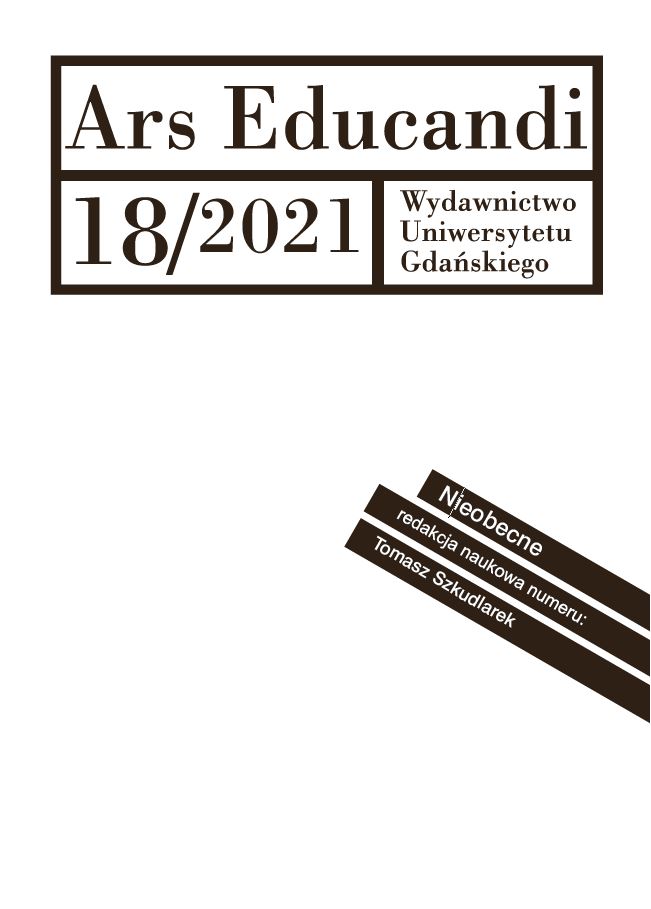Instrumentality after Radical Lack, Education, and Populism as Co-Prosthetic
DOI:
https://doi.org/10.26881/ae.2021.18.08Keywords:
Education, Populism, Instrumentality, Antagonism, Radical NegativityAbstract
This contribution refuses two positions: one defends education against instrumentality, and the other reduces education to a political instrument. Alternatively, it recognizes instrumentality as precarious but necessary. Thus, with focus on populist articulations, education is instrumentalized as a demand to fix the people's incompleteness. However, both education and the people are lacking totalities, and it is through their articulation as prosthetic bodies one to the other that they help each other to be, however without fully being
Downloads
Download data is not yet available.
References
Althusser, L. (1969). Contradiction and overdetermination. For Marx, 17.
Conor Burns, April 11, 2008 in https://conservativehome.blogs.com/centreright/2008/04/making-history.html
Glynos, J., & Howarth, D. (2007). Logics of critical explanation in social and political theory. Routledge.
Heidegger, M. (1954). The question concerning technology. Technology and values: Essential readings, 99, 113.
Ihde, D. (1990), Technology and the Lifeworld. From Garden to Earth, Indiana University Press.
Labour Party (1997) Because Britain Deserves. Labour Party Manifesto.
Labour Party (2017), For The Many Not The Few. Labour Party Manifesto.
Labour Party (2019), It Is Time For Real Change. Labour Party Manifesto.
Laclau, E, & Mouffe, C. (2014). Hegemony and socialist strategy: Towards a radical democratic politics. Verso Trade.
Marchart, O. (2012). Antagonism and technicity: Bernard Stiegler on eris, stasis and polemos. New Formations, 77(77), 150-163.
Mouffe, C. (2005). The return of the political (Vol. 8). Verso.
Szkudlarek, T. (2017). On the politics of educational theory: Rhetoric, theoretical ambiguity, and the construction of society (p. 152). Taylor & Francis.
Stiegler, B. (1998). Technics and time: The fault of Epimetheus (Vol. 1). Stanford University Press.
Stiegler, B. (2003). Technics of decision an interview. Angelaki, 8(2), 151-168.
Tony Carusi, F., & Szkudlarek, T. (2020). Education is society… and there is no society: The ontological turn of education. Policy Futures in Education, 18(7), 907-921.
Conor Burns, April 11, 2008 in https://conservativehome.blogs.com/centreright/2008/04/making-history.html
Glynos, J., & Howarth, D. (2007). Logics of critical explanation in social and political theory. Routledge.
Heidegger, M. (1954). The question concerning technology. Technology and values: Essential readings, 99, 113.
Ihde, D. (1990), Technology and the Lifeworld. From Garden to Earth, Indiana University Press.
Labour Party (1997) Because Britain Deserves. Labour Party Manifesto.
Labour Party (2017), For The Many Not The Few. Labour Party Manifesto.
Labour Party (2019), It Is Time For Real Change. Labour Party Manifesto.
Laclau, E, & Mouffe, C. (2014). Hegemony and socialist strategy: Towards a radical democratic politics. Verso Trade.
Marchart, O. (2012). Antagonism and technicity: Bernard Stiegler on eris, stasis and polemos. New Formations, 77(77), 150-163.
Mouffe, C. (2005). The return of the political (Vol. 8). Verso.
Szkudlarek, T. (2017). On the politics of educational theory: Rhetoric, theoretical ambiguity, and the construction of society (p. 152). Taylor & Francis.
Stiegler, B. (1998). Technics and time: The fault of Epimetheus (Vol. 1). Stanford University Press.
Stiegler, B. (2003). Technics of decision an interview. Angelaki, 8(2), 151-168.
Tony Carusi, F., & Szkudlarek, T. (2020). Education is society… and there is no society: The ontological turn of education. Policy Futures in Education, 18(7), 907-921.
Downloads
Published
2021-11-14
How to Cite
Atif, A. (2021). Instrumentality after Radical Lack, Education, and Populism as Co-Prosthetic. Ars Educandi, 18(18), 129–142. https://doi.org/10.26881/ae.2021.18.08
Issue
Section
Artykuły i rozprawy

 Academic Scientific Journals
Academic Scientific Journals




